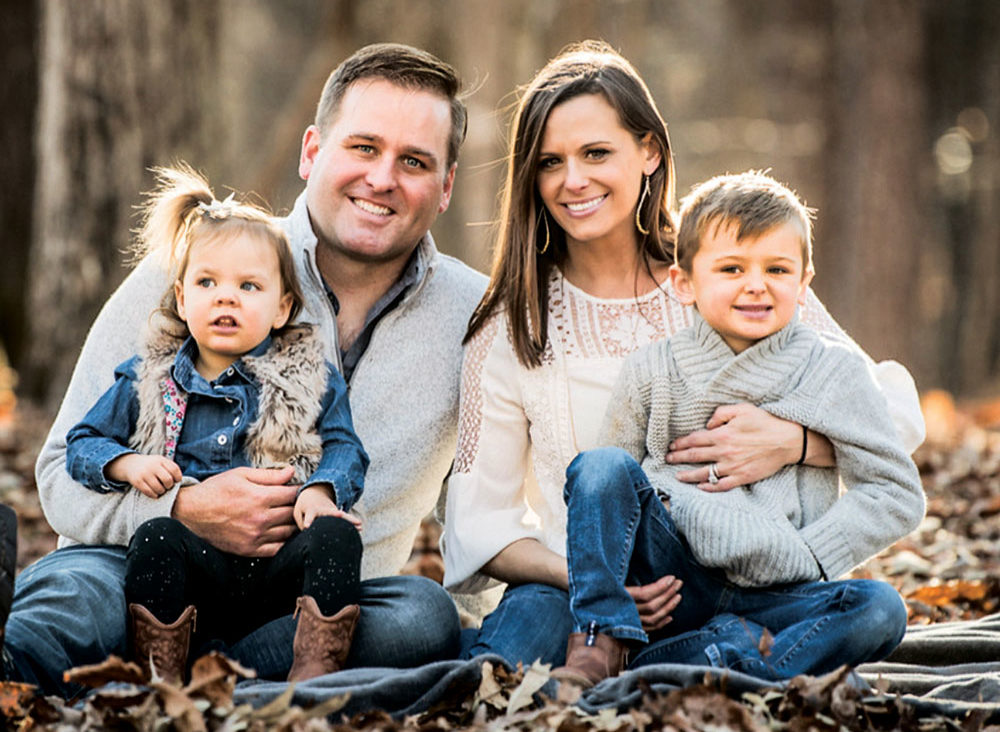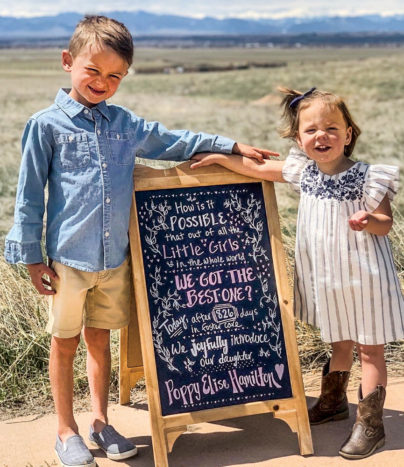
Central Park North residents Brad, Deanna, Poppy, and Brooks Hamilton were a family long before the state made it official in April 2020. Photo by David Winters

When Deanna and Brad Hamilton decided to grow their family, they considered many paths to having another child. In the end, they opted to become foster parents, going through a process with some hurdles and no guarantee of adoption. In April, however, the state of Colorado legally recognized them as Poppy’s parents and son Brooks as Poppy’s brother. Photo by Deanna Hamilton
826 days. That’s how long Poppy was in foster care. She was fortunate to be cared for and loved by a single family for most of those days. Still, from 3 months to age 2½, she lived in the legal limbo that makes foster care the least-favored option for many who wish to grow their families. Now, after their April 22, 2020 adoption-by-video-conference officially made Poppy their daughter, Brad and Deanna Hamilton reflect on their two-year journey through a system punctuated with obstacles as well as the most profound opportunity.
Discouraged by lengthy adoption waitlists, they explored foster care. “There are over 400,000 children in foster care and over 100,000 are waiting to be adopted,” says Deanna. The same day they enrolled in the required foster care training, they learned that their carriage house tenant was going to be fostering a baby. Deanna began to care for 3-month-old Poppy five days a week while the tenant went to work.
Once certified in CPR and all the other elements of training, the Hamiltons received several calls notifying them of a baby’s availability. Each time, however, another family responded before they could. In many cases, they say, these infants had been born to mothers with drug addictions, meaning that the newborns, too, required special treatment. Contemplating their 2-year odyssey, Brad says, “We’ve learned from this that mental illness is real and drugs are addictive…the kids we have seen in the hospitals and in the system show me that there’s no way to use meth and heroin that doesn’t affect other people.”
When their tenant realized fostering wasn’t the right fit for her, Poppy’s biological grandparents agreed the Hamiltons should continue to care for the baby. At eight months, the Hamiltons became Poppy’s foster parents. Still, they lived with tremendous uncertainty. Poppy’s biological mother had parental rights and regularly met with Poppy. “She really loved seeing her daughter twice a week…Every situation is different, but from everything we’ve seen, these parents are given every opportunity and every resource to succeed. And they don’t not succeed because they’re bad people,” says Brad. Melissa Maile, MSW, In-Home Director for Mount St. Vincent human services agency affirms that parents’ inability to care for their children or a positive drug screen in a newborn are common reasons babies enter the foster system.

Brooks and Poppy celebrate the day they legally became siblings. Photo by Deanna Hamilton
Both the Hamiltons and Maile acknowledge the system’s emphasis on reunifying biological families. “It’s very hard, to be a foster parent and be a part of the system because there are decisions that are made every day that you may not agree with…but at the end of the day, everyone’s trying to do the best that they can to do what’s right for kids and allow parents the opportunity to have their kids back,” says Maile.
In regular communication with both Poppy’s biological mother and grandparents, the Hamiltons rode an emotional rollercoaster for much of the two-year period they fostered her. “You can’t adopt until the parents’ rights are officially terminated by the County,” says Brad, who speaks of the cyclical “angst” he and Deanna experienced each time it appeared that Poppy’s biological mother might be able to resume caring for her daughter.
This challenge, baked into the foster care system, is the largest hurdle for those who might otherwise consider fostering a child, says Maile. She encourages families to focus on the rich and mutual gift their care embodies, regardless of outcome: “We’re teaching children how to build relationships…Even though it hurts and it’s sad and your heart will break…you have filled in them something so amazing that they’re going to carry that with them for the rest of their lives.” She says about 40-50% of Mount St. Vincent’s foster placements result in adoption each year.
Brad recalls the words of a friend who told him “You’re healthy, well-adjusted, capable adults. You have the ability to overcome this. So don’t give up on this. You have a two-year-old child that doesn’t understand what’s going on.” Brad shares this advice with others now: “Don’t put your own heartache above the needs of an innocent child.”
See the Denver Human Services page: https://www.denvergov.org/content/denvergov/en/denver-human-services/be-involved/foster.html Additional resources are available at Mt. St. Vincent: https://www.msvhome.org/foster-care/ and Foster Source: https://fostersource.org


0 Comments